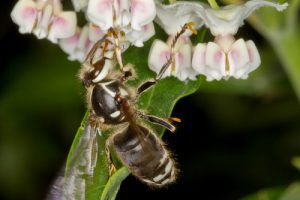Baldfaced Hornets Are Rarely a Problem
By Chris Williams on July 19, 2012.
Q. What’s the big black and white wasp that we’re seeing around our deck? Is it some kind of a yellowjacket? How can we find its nest so we can get rid of it?
A. You’re probably talking about the baldfaced hornet. Despite the name, it isn’t a hornet at all but is a type of yellowjacket, and is our only black and white yellowjacket. It’s named for its white “face.” Although baldfaced hornets are larger than regular yellowjackets, they are much more docile unless their nest is threatened. Then they can sting aggressively. Chances are though that the nest is not anywhere that you or your family will come into contact with it.
You’ve probably seen baldfaced hornet nests without realizing that’s what you were looking at. They build those large, gray, papery nests that you see up in trees in the fall after the leaves drop. The nests are basically pear-shaped but can grow to be as large as a basketball. The nest is usually high up in a tree so treating it is rarely possible and usually not necessary. By the time the nest is noticed in the fall, the hornets are dead or dying. Occasionally, you’ll find a baldfaced nest built on the side of a building under eaves, in low shrubbery, or even in an attic or shed. Nests in these sites may need to be eliminated if they are in areas where children or pets may come into contact with the nest.
Baldfaced hornets are less of a threat to people than regular yellowjackets since their food gathering habits rarely bring them into contact with humans. They are actually beneficial, capturing insects (often including other yellowjackets) to feed to their larvae. Baldfaced hornet workers tend new larvae as the nest grows throughout the summer. A mature colony can have several hundred workers by summer’s end. In fall, the workers die and next year’s queens find overwintering sites. The old nest won’t be reused the following year.
If you discover that the hornets’ nest is on or too near to your deck for your liking, give Colonial Pest Control a call. We can treat the nest if it is accessible so that you can enjoy your deck without worrying about possible hornet stings.
